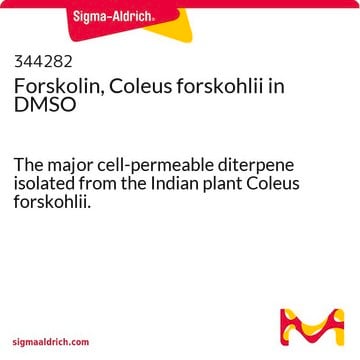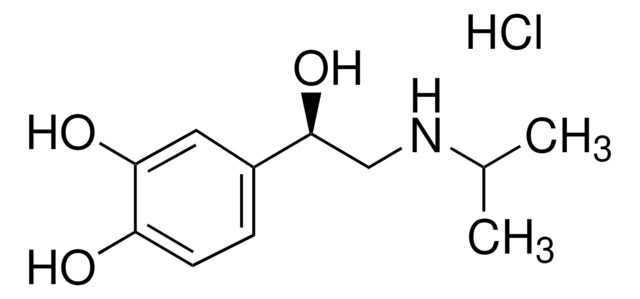344270
Forskolin
from Coleus forskohlii, ≥99% (HPLC), crystalline solid, positive inotropic agent, Calbiochem
Synonym(s):
Forskolin, Coleus forskohlii, 7β-Acetoxy-8,13-epoxy-1α,6β,9α-trihydroxy-labd-14-en-11-one, Colforsin
About This Item
Recommended Products
product name
Forskolin, Coleus forskohlii,
Assay
≥99% (HPLC)
Quality Level
form
crystalline solid
manufacturer/tradename
Calbiochem®
storage condition
OK to freeze
color
white to off-white
solubility
DMSO: 5 mg/mL
shipped in
ambient
storage temp.
10-30°C
InChI
1S/C22H34O7/c1-8-19(5)11-14(25)22(27)20(6)13(24)9-10-18(3,4)16(20)15(26)17(28-12(2)23)21(22,7)29-19/h8,13,15-17,24,26-27H,1,9-11H2,2-7H3/t13-,15-,16-,17-,19-,20-,21+,22-/m0/s1
InChI key
OHCQJHSOBUTRHG-KGGHGJDLSA-N
General description
Biochem/physiol Actions
Caution
Warning
Reconstitution
Other Notes
Noveen, A., et al. 1996. Biochem. Biophys. Res. Commun.219, 180.
Galli, C., et al. 1995. J. Neurosci.15, 1172.
Li, X., et al. 1995. Am. J. Physiol.269, C986.
Lomo, J., et al. 1995. J. Immunol.154, 1634.
Uneyama, H., et al. 1993. J. Biol. Chem.268, 168.
Laurenza, A., et al. 1989. Trends Pharmacol. Sci.10, 442.
Adashi, E.Y., and Resnick, C.E. 1986. J. Cell. Biochem.31, 217.
Seamon, K.B., and Daly, J.W. 1986. Adv. Cyclic Nucleotide Protein Phosphorylation Res.20, 1.
Huang, R., et al. 1982. Cyclic Nucleotide Res.8, 385.
Metzger, H., and Lindner, E. 1981. IRCS Med. Sci. Biochem. Cardiovasc. System Pharmacol.9, 99.
Legal Information
Signal Word
Warning
Hazard Statements
Precautionary Statements
Hazard Classifications
Acute Tox. 4 Dermal
Storage Class Code
11 - Combustible Solids
WGK
WGK 3
Certificates of Analysis (COA)
Search for Certificates of Analysis (COA) by entering the products Lot/Batch Number. Lot and Batch Numbers can be found on a product’s label following the words ‘Lot’ or ‘Batch’.
Already Own This Product?
Find documentation for the products that you have recently purchased in the Document Library.
Customers Also Viewed
Our team of scientists has experience in all areas of research including Life Science, Material Science, Chemical Synthesis, Chromatography, Analytical and many others.
Contact Technical Service









